Overview
Navigating Supplemental Security Income (SSI) in North Carolina can feel overwhelming. We understand that many individuals face challenges when seeking assistance. This article offers a comprehensive step-by-step guide to help you through the process, detailing:
- Eligibility criteria
- Required documentation
- Application procedures
- Follow-up steps
Understanding these elements is crucial for securing benefits successfully. SSI plays a critical role in assisting low-income individuals, helping them maintain their dignity and independence. By providing statistics and expert insights, we aim to highlight the importance of this support system.
You are not alone in this journey. We’re here to help you every step of the way. Take a moment to reflect on your situation and consider how this guide can empower you to navigate the complexities of SSI with confidence.
Introduction
Navigating the complexities of Supplemental Security Income (SSI) can feel overwhelming, especially for those in North Carolina who depend on this vital program for financial support. With an estimated 10,400 individuals expected to benefit in 2025, it's essential to grasp the intricacies of eligibility, application processes, and required documentation.
We understand that many potential recipients may feel lost amidst the sheer volume of information and the steps involved. How can you ensure that you not only qualify but also successfully navigate the application process to secure the benefits you need?
You're not alone in this journey, and we're here to help.
Understand Supplemental Security Income (SSI) Basics
Supplemental Security Income (SSI) is an essential federal program designed to provide financial aid to individuals with disabilities, seniors, and those with limited income and resources. In North Carolina, supplemental security income north carolina plays a vital role in assisting recipients with their basic living expenses, such as food, clothing, and shelter. Because it is a needs-based program, eligibility for SSI hinges on financial criteria rather than work history, making it accessible to many who truly need support.
In 2025, approximately 10,400 individuals in North Carolina are expected to receive supplemental security income north carolina benefits, contributing to a broader context of around 7.4 million SSI recipients nationwide. For many older adults, SSI can serve as a lifeline, helping them meet their basic needs on a fixed income. The typical monthly disbursement for SSI recipients in January 2025 is projected to be $714, with the highest monthly payment reaching $967 for single individuals and $1,450 for couples.
It's common to feel overwhelmed when navigating government benefits like SSI. That's where Turnout comes in, simplifying access by offering tools and services that help individuals through the complexities of the application process. Financial advisors emphasize the importance of understanding SSI, noting that it can significantly impact the financial stability of those with low income. As one expert wisely stated, "Navigating the complexities of SSI is essential for those who rely on it for their livelihood. Knowing the ins and outs can make a substantial difference in securing the benefits you deserve."
The impact of supplemental security income North Carolina on low-income individuals cannot be overstated. It not only provides crucial financial support but also helps recipients maintain their dignity and independence. By grasping the fundamentals of SSI, potential beneficiaries can enhance their preparedness for the enrollment process and ensure they receive the assistance they need. Remember, you are not alone in this journey; we’re here to help you every step of the way.
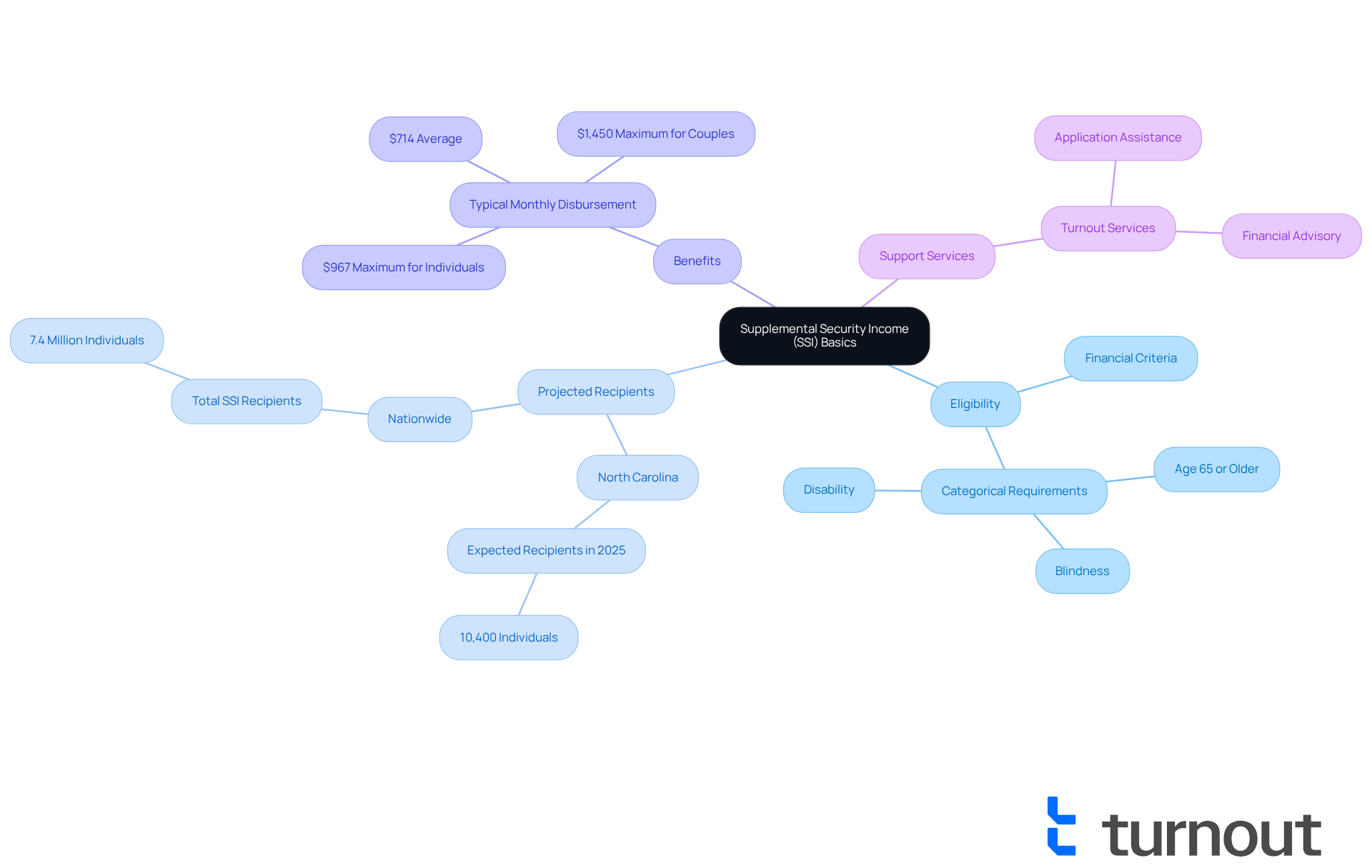
Determine Your Eligibility for SSI in North Carolina
If you're considering applying for supplemental security income North Carolina, it's important to understand the key criteria that can help you qualify. We know that navigating this process can be overwhelming, but we're here to support you every step of the way.
First, you need to meet the age or disability requirement. This means you must be at least 65 years old, blind, or have a qualifying disability. Next, your income must fall below certain limits. For 2024, the federal benefit rate is set at $943 per month for individuals and $1,415 for couples. Remember, these amounts are adjusted annually, so it's good to stay informed.
Additionally, there are resource limits to consider. Individuals typically should not have resources exceeding $2,000, while couples must stay under $3,000. Resources include cash, bank accounts, and other assets that can be converted to cash. To qualify for supplemental security income North Carolina, it's essential to be a resident of North Carolina and either a U.S. citizen or a qualified non-citizen.
Understanding these eligibility requirements is crucial before submitting your application. Many have successfully qualified for SSI based on age or disability, showing that meeting these criteria can lead to vital financial support. It's common to feel uncertain about this process, but know that the initial $65 of any monthly earned income is excluded from SSI calculations. This allows recipients to maintain some level of income while receiving benefits.
Finally, remember that SSI eligibility can be complex. We encourage you to seek assistance to help navigate the enrollment process efficiently. You're not alone in this journey, and there are resources available to guide you towards the support you need.
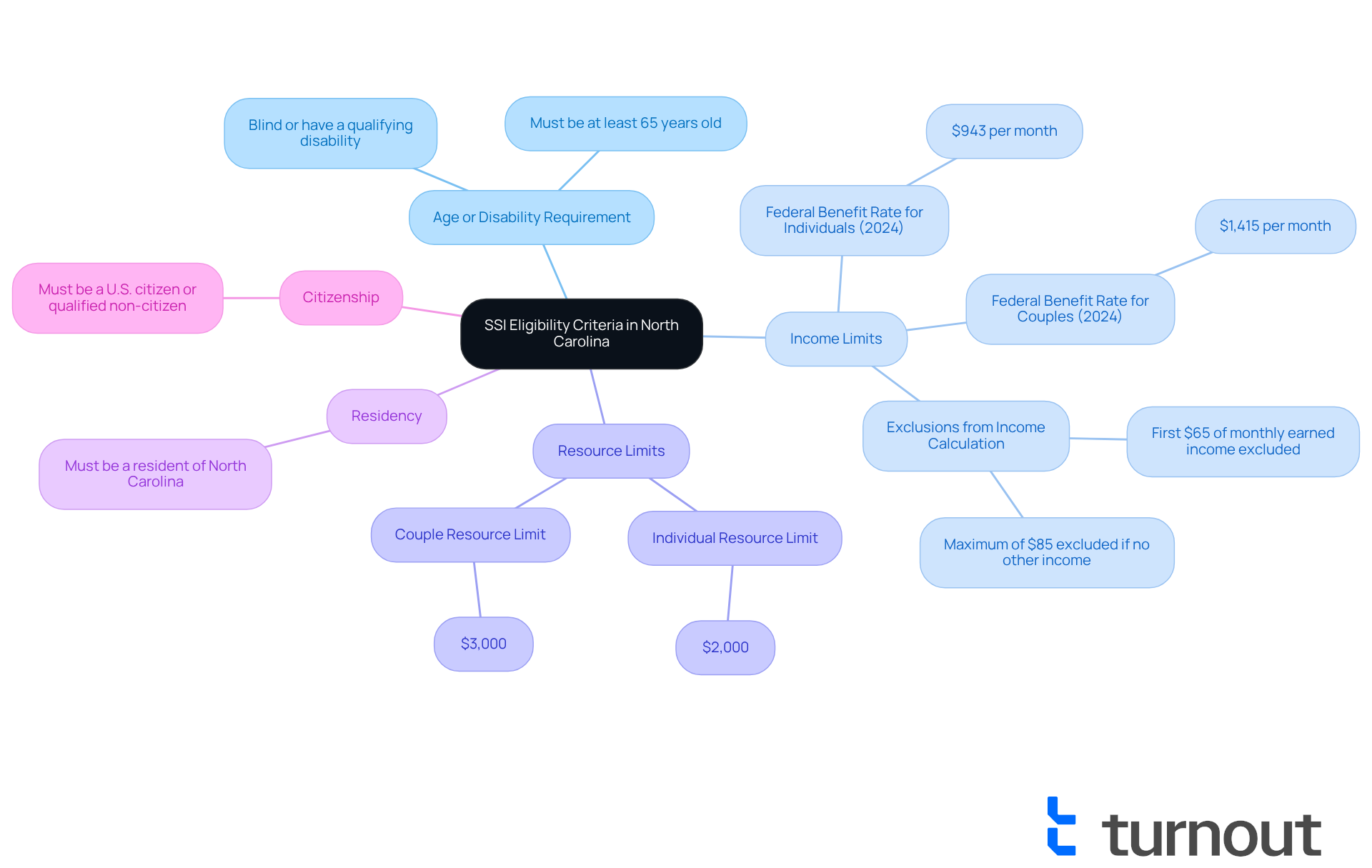
Gather Required Documentation for Your Application
Before you apply for supplemental security income north carolina, it’s important to gather several key documents that can significantly improve your chances of approval. We understand that this process can feel overwhelming, but having the right paperwork can make a world of difference.
- Proof of Identity: Start with a government-issued ID, like a driver’s license or passport. This is essential for verifying who you are.
- Social Security Number: Make sure to include your Social Security card or any official document that shows your number. This is a crucial part of your application.
- Financial Information: Collect your bank statements, pay stubs, and any other documents that reflect your income. Many applicants face denials for supplemental security income north carolina due to incomplete financial disclosures, making it vital to report all sources of income accurately.
- Medical Records: Obtain comprehensive documentation from your healthcare providers detailing your disability or condition. Insufficient medical evidence is a common reason for supplemental security income north carolina requests being denied, making this step essential.
- Living Arrangements: Provide information about your living situation, including rent or mortgage statements, to demonstrate your housing status.
Having these documents ready not only simplifies the submission process but also greatly enhances your likelihood of success. Social workers emphasize that thorough documentation is key; as one noted, "Gathering all necessary documents can make the difference between approval and denial." Remember, the earliest SSI payment can start the month following the submission of your request, so prompt preparation is crucial. You are not alone in this journey; we’re here to help you every step of the way.
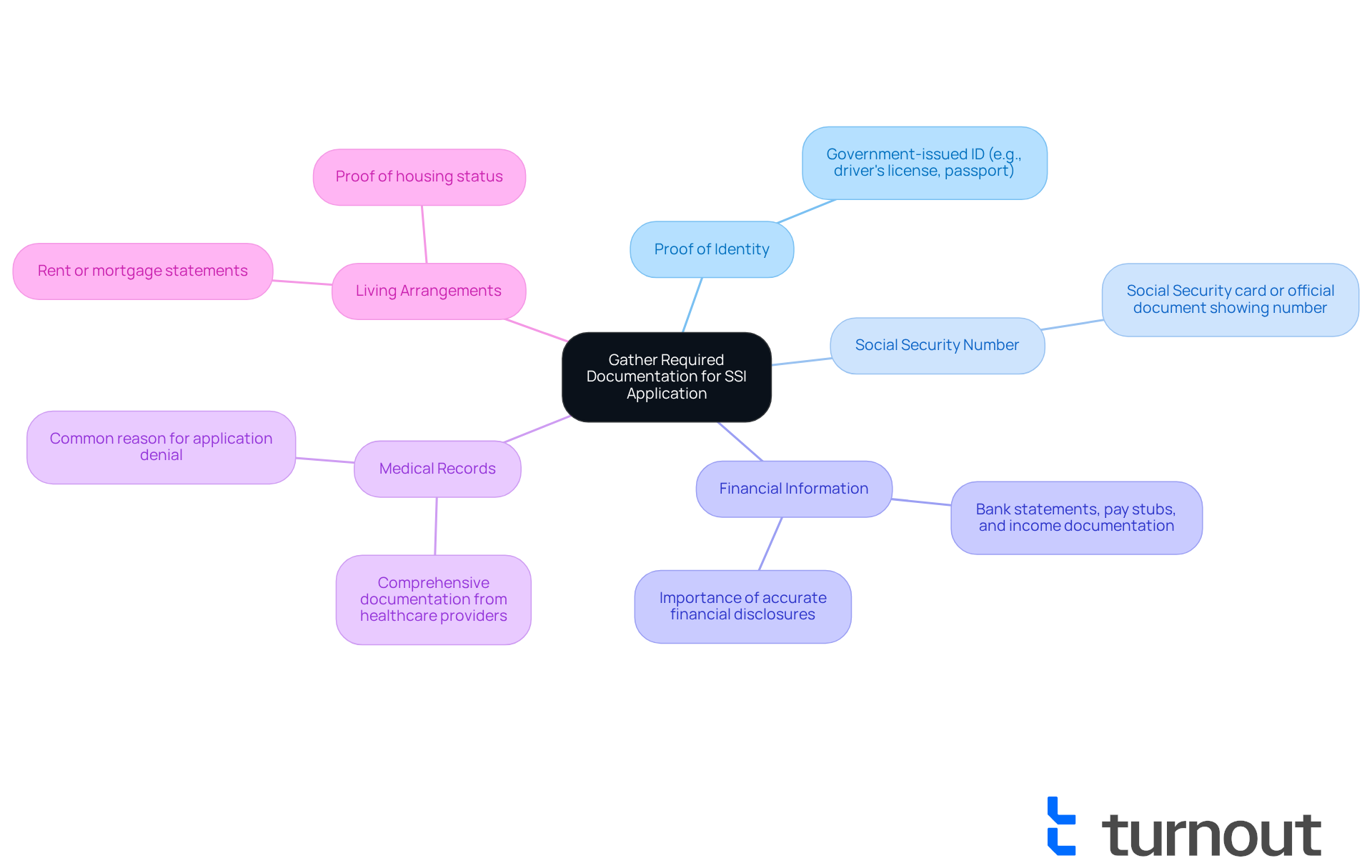
Complete Your SSI Application Process
Completing your supplemental security income North Carolina application can feel overwhelming, but with the support of Turnout, you can navigate this supplemental security income North Carolina process more easily. Here are the steps to follow:
- Online Form: Begin by visiting the Social Security Administration (SSA) website to fill out the online form. If you prefer, you can also apply by phone or in person at your local SSA office.
- Fill Out the Form: It’s important to provide accurate information about your personal details, income, and living situation. Remember to list every medical condition that affects your ability to work, as the SSA will evaluate the combined impact of all your impairments.
- Submit Documentation: Gather the necessary documents, such as your birth certificate, W-2 forms, and an Adult Disability Report. When completing the online form, be sure to agree to the disclosure of your medical records to the SSA by selecting 'yes' at the end.
- Review Your Application: Before submitting, take a moment to double-check all information for accuracy. Common mistakes include incomplete documentation and not meeting eligibility criteria, which can lead to denial of benefits. Engaging Turnout's trained nonlegal advocates can greatly enhance your experience by providing valuable assistance in reviewing your submission for accuracy and completeness.
- Submit Your Request: Once everything is in order, submit your request and keep a copy for your records. Remember, you must sign and submit your request within six months to avoid starting over.
In 2025, the average processing duration for requests for supplemental security income North Carolina is around 225 days, indicating considerable delays caused by heightened backlogs. Utilizing Turnout's services can help expedite approvals and improve your chances of success. Many supporters highlight that having help can significantly enhance your experience and outcomes. Just a gentle reminder: Turnout is not a law firm, and their services do not constitute legal advice. You're not alone in this journey, and we're here to help.
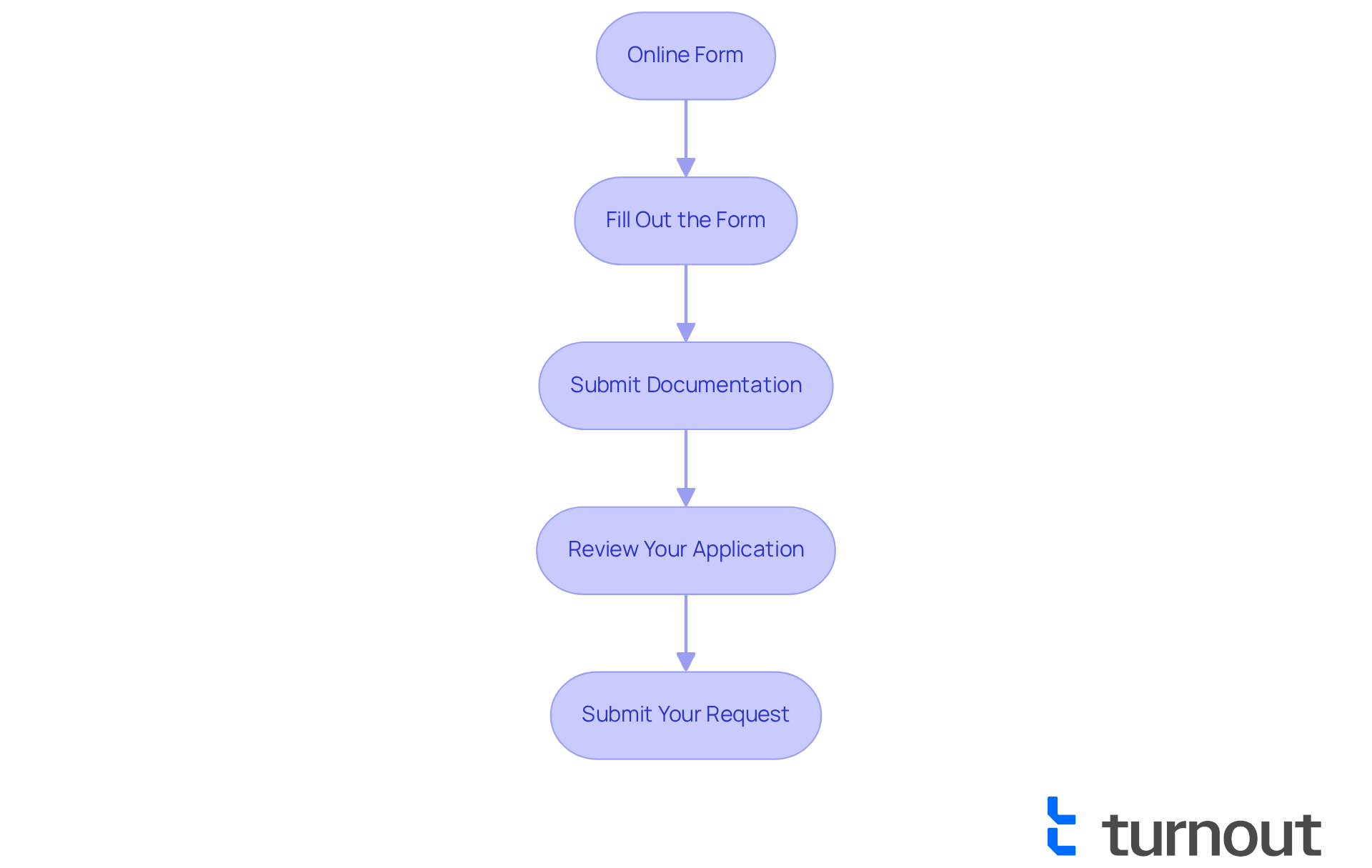
Follow Up on Your SSI Application Status
After submitting your SSI application, following up is crucial to ensure your claim is progressing smoothly. We understand that this process can feel overwhelming, but taking proactive steps can make a significant difference.
- Wait for Confirmation: Anticipate receiving a confirmation of your submission. This confirmation is your initial sign that the process has begun.
- Check Status Online: Utilize the SSA's online portal to track the status of your request. This tool provides real-time updates and is a convenient way to stay informed about your application.
- Contact SSA: If you haven't received any updates within a few weeks, it’s common to feel anxious. Reach out to your local SSA office, either by phone or in person, to inquire about your status. Given that the current average wait time for new applicants is around 225 days—an 86% increase from the average wait time of four months in November 2019—proactive communication is essential.
- Be Prepared: When reaching out to the SSA, have your submission details ready, including your Social Security number and any reference numbers. This preparation will facilitate a quicker response and ease your mind.
- Respond Promptly: If the SSA requests additional information or documentation, respond as quickly as possible. Delays in providing requested information can significantly prolong the decision-making process, which can be frustrating.
It's important to recognize that around 30% of SSI submissions necessitate follow-up inquiries. This emphasizes the importance of remaining involved with your request. Experts highlight that timely follow-ups can greatly influence the outcome of your claim. For example, individuals who actively monitor their progress often report smoother experiences and quicker resolutions. As one specialist remarked, "Once you have provided your request for disability benefits, it typically takes 6 to 8 months for a preliminary decision."
As of November 2023, the processing times for SSI applications remain historically high, making diligent follow-up even more critical. Additionally, automated phone assistance is available 24/7 for those who may not have internet access, providing another avenue for applicants to stay informed. Remember, you are not alone in this journey—we're here to help you every step of the way.
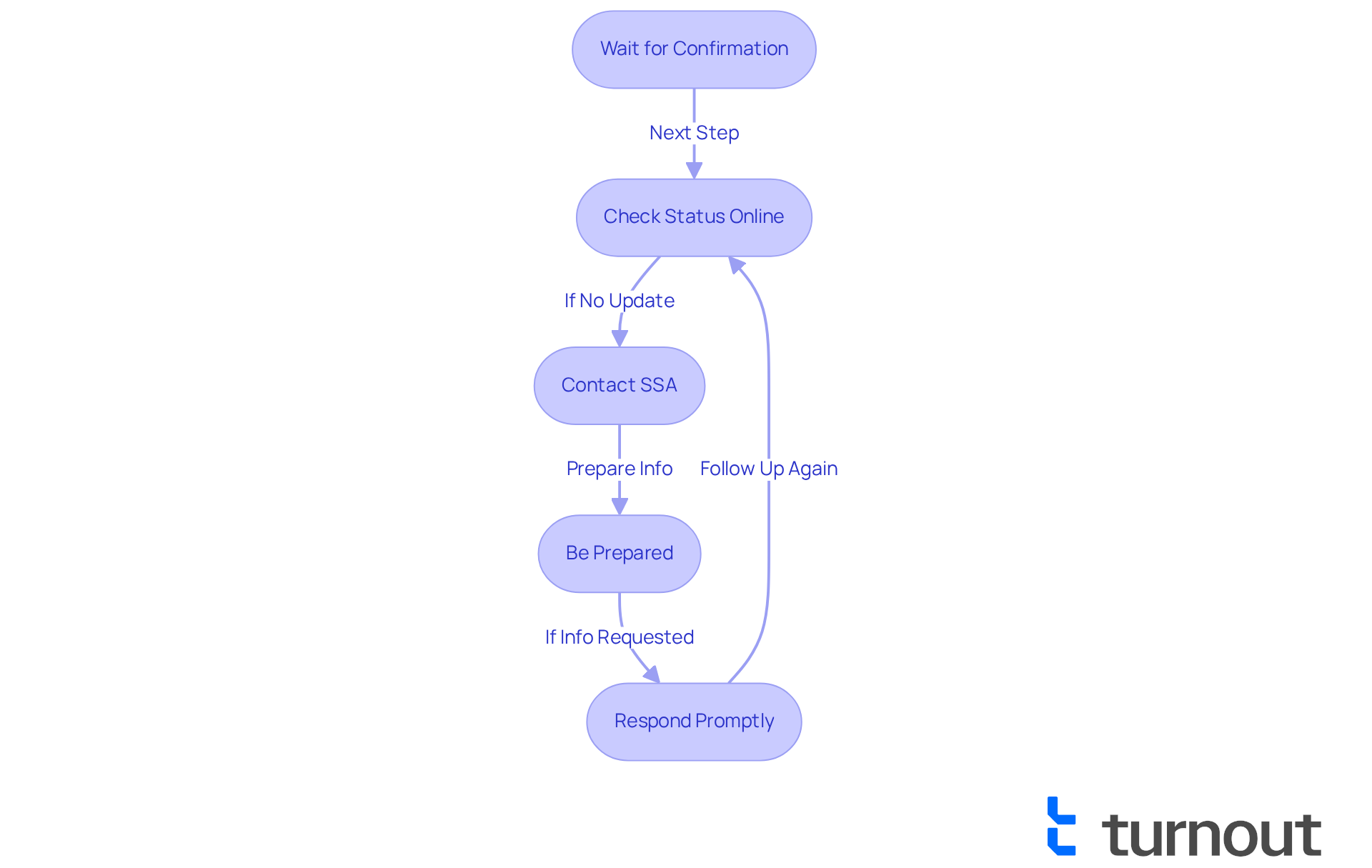
Conclusion
Navigating the complexities of Supplemental Security Income (SSI) in North Carolina can feel overwhelming for those seeking financial support due to disabilities, age, or limited income. This guide aims to help you understand, apply for, and follow up on SSI benefits, highlighting the program's vital role in providing a lifeline for many residents.
We understand that determining eligibility can be confusing. Key points to consider include:
- The fundamental criteria such as age or disability requirements
- Income limits
- The necessary documentation for a successful application
Thorough preparation and proactive follow-up with the Social Security Administration (SSA) are essential; these actions can significantly influence the outcome of your application process.
It's common to feel daunted by the journey to secure SSI benefits, but remember that assistance is available. By taking informed steps and utilizing resources like Turnout, you can navigate the SSI application process more effectively. Empowerment through knowledge is crucial. Staying engaged with your application status can lead to timely support, ensuring that you receive the financial assistance you deserve.
You are not alone in this journey. We’re here to help you every step of the way.
Frequently Asked Questions
What is Supplemental Security Income (SSI)?
Supplemental Security Income (SSI) is a federal program that provides financial aid to individuals with disabilities, seniors, and those with limited income and resources, helping them with basic living expenses like food, clothing, and shelter.
Who is eligible for SSI in North Carolina?
To be eligible for SSI in North Carolina, individuals must be at least 65 years old, blind, or have a qualifying disability. They must also meet specific income and resource limits.
What are the income limits for SSI in 2024?
For 2024, the federal benefit rate is set at $943 per month for individuals and $1,415 for couples.
What are the resource limits for SSI eligibility?
Individuals typically should not have resources exceeding $2,000, while couples must stay under $3,000. Resources include cash, bank accounts, and other assets that can be converted to cash.
Do I need to be a resident of North Carolina to qualify for SSI?
Yes, to qualify for Supplemental Security Income in North Carolina, you must be a resident of the state and either a U.S. citizen or a qualified non-citizen.
How can SSI impact low-income individuals?
SSI provides crucial financial support to low-income individuals, helping them maintain their dignity and independence while meeting their basic needs.
What is the typical monthly disbursement for SSI recipients in January 2025?
The typical monthly disbursement for SSI recipients in January 2025 is projected to be $714, with the highest payments reaching $967 for single individuals and $1,450 for couples.
What resources are available to help with the SSI application process?
Organizations like Turnout offer tools and services to simplify access to SSI and help individuals navigate the complexities of the application process.
Is there any earned income that is excluded from SSI calculations?
Yes, the initial $65 of any monthly earned income is excluded from SSI calculations, allowing recipients to maintain some level of income while receiving benefits.
What should I do if I feel overwhelmed by the SSI application process?
If you feel overwhelmed, it's important to seek assistance to help navigate the enrollment process efficiently, as there are resources available to guide you.




